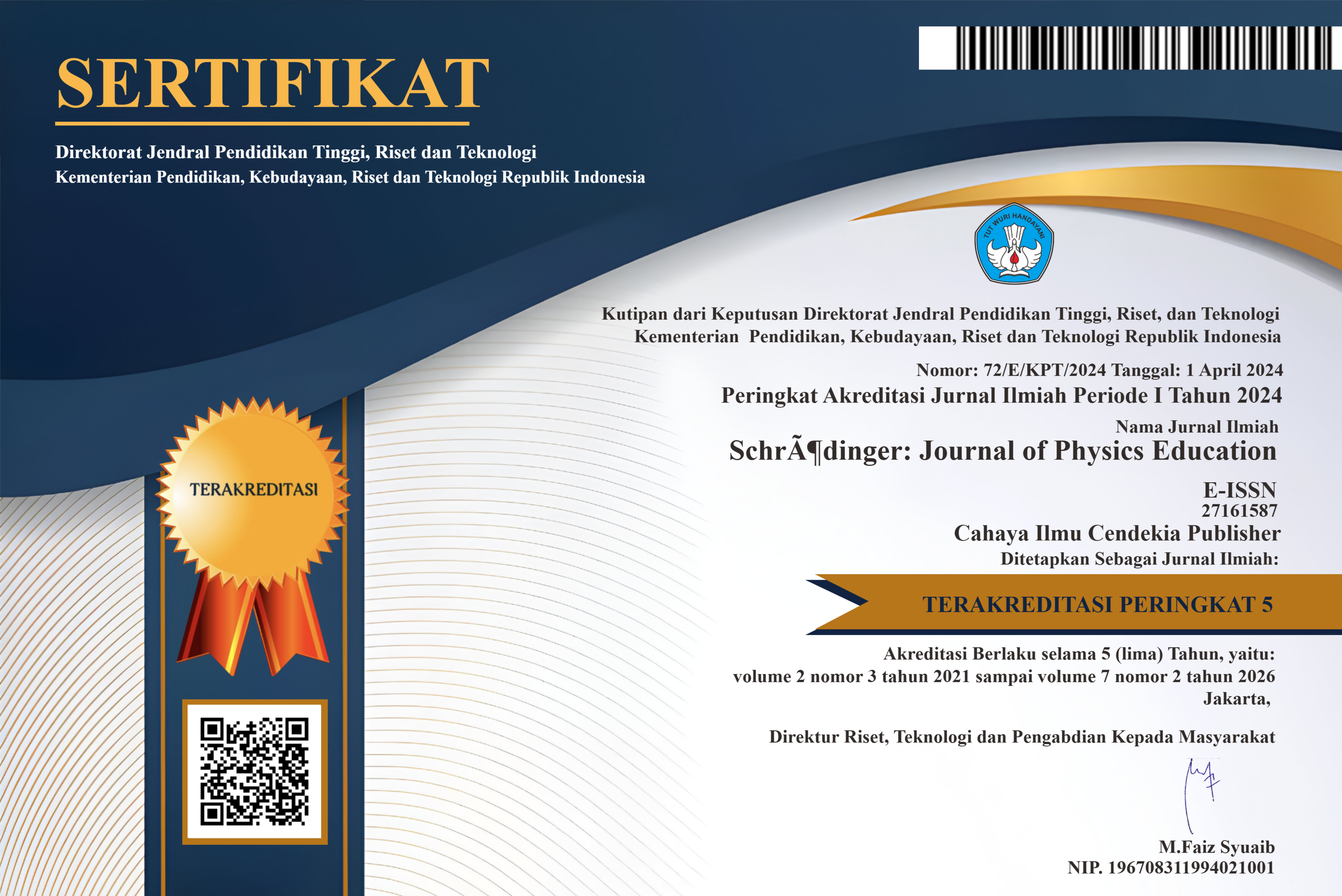Describing the Ability of Science Processes in Basic Physics Practicum II Material of Ice Melting Heat Using E-Modules
Abstract
Purpose of the study: The purpose of this study was to determine the level of students' science process skills and to determine the effect of using e-modules in the Basic Physics II practicum with the material melting heat of ice.
Methodology: This research is a type of quantitative research with descriptive methods. The subjects in this study were 40 second semester students of Physics Education at Jambi University. The data collection instrument used was an observation sheet of science process skills that had been validated previously to assess students' science process skills in carrying out practicums. Data collection was carried out with the help of an observer who observed each student and the data was analyzed using statistical analysis.
Main Findings: Based on the results of data analysis, it shows that the use of e-modules is effective in carrying out practicums and the average student science skill level is in the SB category (very good).
Novelty/Originality of this study: The novelty of the research can be seen from the results of the research that has been done. It is evident that the E-module, apart from being easy to access and easy to carry around, also contains detailed information regarding practicum material. This is because the e-module is packaged in a web form that students can access anywhere and anytime, whereas using a conventional guide will result in a lack of efficiency because the more material is included, the heavier it will be and the more paper used to print the guide.
References
E. R. Farmi, “Analisis Lingkungan Belajar Siswa pada Mata Pelajaran Fisika di SMA Negeri 10 Kota Jambi”, Schrödinger: Journal of Physics Education(SJPE), vol.1, no.1, pp.7-12, 2020
Tanti, D. A. Kurniawan, R. Perdana and O. H. Wiza, “Comparison of Students’ Attitudes toward Natural Sciences in Rural Middle Schools in Jambi Province”, Jurnal Ta’dib, vol. 23, no.1, pp. 63-73, 2020
Maison, Syahrial, Syamsurizal, and Tanti, “Learning Environment, Students’ Beliefs, and Self-Regulation in Learning Physics:Structural Equation Modeling”, Journal of Batlic Science Education, vol.18, no.3, pp.389-403, 2019
Maison, Astalini, Darmaji, D. A. Kurniawan, R. Perdana and L. Anggraini, “The Phenomenon of Physicology Senior High School Education: Relationship of Students' Attitudes toward Physic, Learning Style, Motivation”, Uiniversal Journal of Education Research, vol.7, no.10, pp.2199 – 2207, 2019
R. W. Dari and A. Suzima, “DeskripsiKemampuan Berpikir Kritis Siswa Sman 8 Muaro Jambi”, Schrödinger: Journal of Physics Education(SJPE), vol.1, no.2, pp.36-43, 2020.
A. Rahayu and D. D. Ramadona, “Deskripsi Implikasi Sosial dari Fisika, Sikap Terhadap Penyelidikan dalam Fisika dan Adopsi dari Sikap Ilmiah”, Schrödinger: Journal of Physics Education(SJPE), vol. 1, no. 1, pp.13-17, 2020
E. Sulistiani, R. S. Budiarti and Muswita, “Analisis Kemampuan Berpikir Kritis Siswa Lintas Minat pada Pembelajaran Biologi Kelas X IIS SMA Negeri 11 Kota Jambi”, Jurnal BIODIK, vol. 2, no.1, pp.13-19, 2016
Tanti, Jamaluddin and B. Syefrinando, “Pengaruh Pembelajaran Berbasis Masalah Terhadap Beliefs Siswa Tentang Fisika dan Pembelajaran Fisika”, Jurnal Ilmiah Pendidikan Fisika Al-BiruNi, 6(1), 23-36, 2017
Astalini, Darmaji, D. A. Kurniawan, R. Perdana and D. S. Putra, “A study relationship attitude toward physics, motivation, and character discipline students senior high school in Indonesia”, IJLT : International Journal of Learning and Teaching, vol. 11, no. 3, pp.99 – 109, 2019
Maison, Astalini, D. A. Kurniawan and L.R. Sholihah, “Deskripsi Sikap Siswa SMA Negeri pada Mata Pelajaran Fisika”, EDUSAINS, vol. 10, no.1, pp.160 – 167, 2018
C. I. Sayekti, Sarwanto and Suparmi, “Pembelajaran IPA Menggunakan Pendekatan Inkuiri Terbimbing Melalui Metode Eksperimen Dan Demonstrasi Ditinjau dari Kemampuan Analisis dan Sikap Ilmiah Siswa”, Jurnal Inkuiri, vol.1, no.2, pp.142–153, 2012
U. Sulistiyo, A. Mukminin, K. Abdurrahman and Haryanto, “Learning to Teach: A Case Study of Students Teachers’ Practicum and Policy Recommendations”, The Qualitatuve Report, vol. 22, no.3, pp. 721-731, 2017
Darmaji, D. A. Kurniawan and Irdianti, “Physics Education Student’s Science Process Skills”, IJERE : International Journal of Evaluation and Resarch in Education, vol.8, no.2, pp. 293 – 298, 2019
Haryanto, Harizon and Anisah, “Pengaruh penerapan model pembelajaran kooperatif tipe make-a match terhadap hasil belajar siswa pada materi larutan elektrolit dan nonelektrolit di SMA PGRI 2 kota jambi”, J. Indo. Soc. Integ. Chem, vol.8, no.2, pp. 47-56, 2016
D. D. Ramadona and D. Adila, “Analisis Kemampuan Berpikir Kritis Siswa SMA Pada Materi Gerak Harmonik Sederhana”, Schrödinger: Journal of Physics Education(SJPE), vol. 1, no.2, pp. 59-66, 2020
Zubaedi, Desain Pendidikan Karakter : Konsepsi dan Aplikasinya dalam Lembaga Pendidikan. Jakarta : Kencana, 2011
N. I. Haq, “PengembanganWorksheet Materi GelombangBerbasis Keterampilan Proses Sains”, Schrödinger: Journal of Physics Education(SJPE), vol. 1, no.2, pp. 48-53, 2020
Darmaji, D. A. Kurniawan, A. Suryani and A. Lestari, “An Identification of Physics Pre-service Teachers’s Science Process Sckills Through Science Process Skills-Based Practicum Guidebook”, Jurnal Ilmiah Pendidikan Fisika Al-BiRuNi, vol. 7, no. 2, pp. 239 – 245, 2018
Maison, Darmaji, Astalini, D. A. Kurniawan and P. S. Indrawatis, “Science Process Skills and Motivation”, Humanities & Social Science Reviews, vol. 7, no. 5, pp. 48 – 56, 2019
Darmaji, D. A. Kurniawa, H. Parasdila and Irdianti, “Description of Science Process Skills Physics Education Students at Jambi University in Temperature and Heat Materials”, The Educational Review, vol. 2, no. 9, pp. 485 – 498, 2018
Haryanto, Harizon and N. K. Ratih, “Pengembangan Instrumen Penilaian Keterampilan Proses dan Sikap Ilmiah pada Materi Termokimia Kelas XI MIA SMA Negeri 10 Kota Jambi”, J. Indo. Soc. Integ. Chem., vol. 8, no. 1, pp. 41-53, 2015
R. Dewi, R. S. Budiarti and M. Aina, “Pengembangan Lembar Kegiatan Peserta Didik (LKPD) Bermuatan Pendidikan Karakter dengan Model Pembelajaran Guided Inquiry pada Materi Bakteri Bagi Siswa Kelas X Sekolah Menengah Atas”, Jurnal BIODIK, vol. 3, no. 1, pp. 17-26, 2017
M. Andani, “E-ModulFisika Dasar I Berbasis 3D Pageflip Professional”, Schrödinger: Journal of Physics Education(SJPE), vol. 1, no. 2, pp. 44-47, 2020
Darmaji, Astalini, D. A. Kurniawa and N. R. Nasih, “Persepsi Mahasiswa pada Penuntun Praktikum Fisika Dasar II Berbasis Mobile Learning”, Jurnal Pendidikan : Teori, Penelitian, dan Pengembangan, vol. 4, no. 4, pp. 516 – 523, 2019
W. Annisak, “PengembanganInstrument Miskonsepsi Fisika Berbasis WebMelalui CRI (Certainty Of Response Index)”, Schrödinger: Journal of Physics Education(SJPE), vol. 1, no. 2, pp. 54-58, 2020
Astalini, Darmaji, W. Kurniawan, K. Anwar and D. A. Kurniawan, “Effectiveness of Using E-Module and E-Assessment”, iJIM : International Journal of Interactive Mobile Technologies, vol. 13, no. 9, pp. 21 – 39, 2019
Abdurrahman, Gardjito and R. S. Budiarti, “Pengembangan Lembar Kegiatan Siswa Berbasis Penemuan Terbimbing pada Materi Struktur dan Fungsi Jaringan Tumbuhan Kelas XI SMA”, Jurnal BIODIK, vol. 1, no. 1, pp. 1-8, 2015
Darmaji, D. A. Kurniawa, Astalini, W. Kurniawan, K. Anwar and A. Lumbantoruan, “Student’s Perception of Electronic Module in Physics Practicum”, Journal of Education and Learning (EduLearn), vol. 13, no. 2, pp. 288 – 294, 2019
F. A. Perdana, Sarwanto and Sukarmin, “Pengembangan Modul Elektronik Fisika Berbasis Keterampilan Proses Sains untuk Meningkatkan Kemampuan Berpikir Kritis dan Motivasi Belajar Siswa SMA/MA Kelas X pada Materi Dinamika Gerak”, Jurnal Inkuiri, vol. 6, no. 3, pp. 61 – 76, 2017
Asrial, Syahrial, D. A. Kurniawan, R. Septianingsih and R. Perdana, “Multimedia Innovation 4.0 in Education : E-Modul Ethnoconstrucctivism”, Universal Journal of Education Research, vol. 7, no. 10, pp. 2098 – 2107, 2019
Copyright (c) 2023 Febrina Rosa Winda, M Shofiardin

This work is licensed under a Creative Commons Attribution-NonCommercial 4.0 International License.
Authors who publish with this journal agree to the following terms:
- Authors retain copyright and acknowledge that the Schrödinger: Journal of Physics Education is the first publisher licensed under a Creative Commons Attribution 4.0 International License.
- Authors are able to enter into separate, additional contractual arrangements for the non-exclusive distribution of the journal's published version of the work (e.g., post it to an institutional repository or publish it in a book), with an acknowledgment of its initial publication in this journal.
- Authors are permitted and encouraged to post their work online (e.g., in institutional repositories or on their website) prior to and during the submission process, as it can lead to productive exchanges and earlier and greater citation of published work.






.png)
.png)








.png)
.png)
.png)







